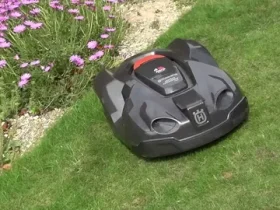In the realm of lawn care, technology continues to revolutionize traditional practices. Among the latest innovations are remote control lawn mowers, which offer convenience, efficiency, and sustainability for modern homeowners. This article delves into the features, benefits, and ecological impact of remote control lawn mowers, highlighting their role as a sustainable choice for maintaining green spaces.
Introduction to Remote Control Lawn Mowers
Remote control lawn mowers represent a significant advancement in the field of landscaping equipment. Unlike conventional push or ride-on mowers, these autonomous devices can be operated remotely, allowing users to navigate their lawns with precision and ease. Equipped with advanced technology such as sensors, GPS, and wireless connectivity, these mowers offer a range of features designed to streamline lawn maintenance tasks.
Features and Functionality
One of the key features of remote control lawn mowers is their ability to be operated from a distance, eliminating the need for manual labor. Users can control the mower’s movements, speed, and cutting patterns using a handheld remote or smartphone app. This level of control enables precise trimming around obstacles, tight corners, and irregular terrain, resulting in a well-manicured lawn with minimal effort.
Furthermore, many remote control lawn mowers are equipped with sensors that detect obstacles in their path, automatically adjusting their course to avoid collisions. Some models also offer programmable schedules, allowing users to set specific times for mowing sessions, thereby optimizing energy consumption and reducing noise pollution during peak hours.
Benefits of Remote Control Lawn Mowers
The adoption of remote control lawn mowers offers several benefits for homeowners and the environment alike:
- Time-Saving: By eliminating the need for manual operation, remote control lawn mowers save users valuable time and effort, allowing them to focus on other tasks or leisure activities.
- Efficiency: The precision and agility of remote control mowers result in more efficient lawn maintenance, ensuring uniform grass height and coverage with minimal overlap or missed spots.
- Sustainability: Compared to traditional gas-powered mowers, remote control models are often electrically powered, producing zero emissions and reducing carbon footprint. Additionally, their precise cutting capabilities promote healthier grass growth, reducing the need for water and chemical inputs.
- Safety: Remote control lawn mowers offer enhanced safety features such as obstacle detection and automatic shut-off mechanisms, minimizing the risk of accidents or injuries during operation.
Ecological Impact
The environmental benefits of remote control lawn mowers extend beyond their zero-emission operation. By promoting healthier grass growth through precise cutting, these mowers contribute to the overall ecological balance of residential landscapes. Healthy lawns absorb carbon dioxide, filter pollutants from the air, and provide habitat for beneficial insects and wildlife.
Furthermore, the use of electric-powered mowers reduces reliance on fossil fuels, thereby mitigating air and noise pollution in residential neighborhoods. This transition towards sustainable lawn care practices aligns with global efforts to combat climate change and preserve natural ecosystems.
Conclusion
Remote control lawn mowers represent a sustainable and technologically advanced solution for modern homeowners seeking efficient and eco-friendly lawn care options. By harnessing the power of automation and electric propulsion, these innovative devices offer convenience, precision, and environmental stewardship in equal measure. As the demand for sustainable living practices continues to grow, remote control lawn mowers are poised to play a significant role in shaping the future of residential landscaping.















Leave a Reply